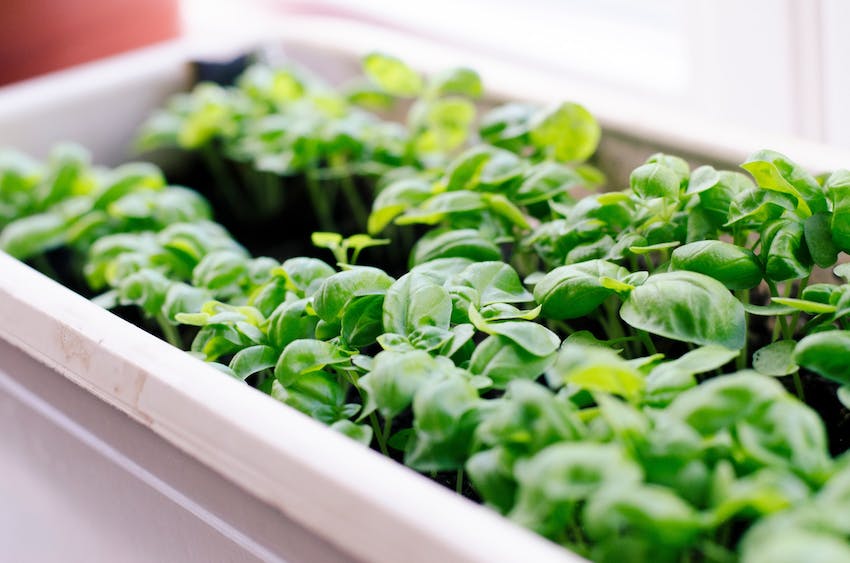I’m really excited for winter for one reason – food. Baking, cooking, gingerbread, soup, everything that is warm and yummy is welcome starting November 1st. While I’m dreading snow touching the ground, I’m excited for baking marathons and bringing my herbs indoors. Even though my house is smaller now, it’s nice to have thyme, lavender, and basil in the kitchen.
Even though the holidays are crazy and I’m cooking all the time, I like knowing that the herbs I have left over from my summer garden won’t hurt my cats. Because who needs to worry about that amongst the holiday insanity.
You and I won’t have to look into which herbs can stay on the counter and which ones should be kept up high. This list should help you and your pet during the busy and happy holiday season, whether you have a dog or a cat.
Growing fresh herbs at home is a rewarding way to add flavor to recipes and decorate your living space. But what if you have a curious cat at home? Not all herbs are created equal when it comes to pet safety. The good news is many popular, easy-to-grow herbs pose little risk for cats that accidentally nibble on a leaf or two. Read on to learn how to cultivate a cat-safe indoor herb garden with these 6 pet-friendly options.
Why Grow Cat-Safe Indoor Herbs?
An indoor herb garden offers numerous benefits
- Convenience of fresh herbs anytime for cooking
- Lovely greenery that purifies indoor air
- Interactive sensory stimulation for pets
- Satisfaction of growing your own plants
But safety should be the number one priority when choosing herbs especially with free-roaming feline friends. While most cats won’t intentionally eat plants it’s best to avoid tempting fate. Focus on herbs considered non-toxic for peace of mind.
6 Ideal Cat-Safe Indoor Herbs
Here are some great cat-friendly herb options to grow indoors:
1. Basil
A favorite for homemade pesto basil is aromatic flavorful, and safe for cats. The bright green leaves also look attractive in indoor herb gardens. Give basil a sunny window and evenly moist soil.
2. Mint
From peppermint to spearmint, most varieties of mint are non-toxic for cats. Mint grows vigorously and makes an excellent houseplant. It can be invasive in the garden, so it’s ideal for containers indoors. Keep soil moist.
3. Catnip
What better herb to grow for a cat than catnip? Most cats go crazy for this intoxicating plant. Catnip is very easy to grow indoors in pots. Pinch off tops frequently to encourage bushy growth.
4. Parsley
A nutrient-dense culinary herb, parsley is another safe option for indoor herb gardens with cats. Curly leaf parsley boasts attractive foliage and a bold flavor. It thrives in bright light.
5. Cilantro
The fresh flavor of cilantro makes it a kitchen staple. Luckily, cats can nibble on cilantro without issues. It will re-sprout after cutting, but has a relatively short life cycle. Sow new seeds every few weeks.
6. Rosemary
An aromatic herb perfect for seasoning meats, rosemary has needle-like leaves and a piney scent. It can grow quite large in containers indoors. Provide at least 6 hours of sun daily.
Growing Tips for Indoor Cat-Safe Herbs
Here are some useful tips for successfully growing herbs indoors:
-
Choose containers at least 6 inches deep and with drainage holes. Clay or ceramic pots work well.
-
Use quality potting soil designed for containers and herbs.
-
Give most herbs at least 6 hours of sunlight daily. South or west windows are ideal.
-
Water whenever the top inch of soil becomes dry. Use room temperature water.
-
Fertilize monthly with a balanced liquid fertilizer to nourish plants.
-
Trim herbs frequently to encourage new growth. Snip off top third of stems.
-
Monitor for pests like aphids or fungus gnats and address issues promptly.
Keeping Indoor Herbs Safe from Cats
Even with cat-safe herbs, it’s smart to take some basic precautions:
-
Keep toxic plants like lilies out of reach of cats to prevent deadly poisoning.
-
Hang herbs or place on high shelves if your cat tends to nibble frequently.
-
Use scent repellants like citrus peels, lavender sprigs, or pennyroyal to deter kitty interest.
-
Avoid using chemical pesticides or fertilizers; stick to organic options.
-
Check for signs of stomach upset like vomiting or diarrhea if kitty eats herbs.
The satisfaction of seasoning your cooking with fresh homegrown herbs is hard to beat. By selecting cat-safe varieties and taking sensible precautions, both you and your feline companions can enjoy the benefits and beauty of an indoor herb garden.
Herbs Safe for Dogs
These can be kept on the counter. If nibbled, your pet will be fine. Of course, anything eaten in large quantities, by human or animal, is usually bad news.
- Basil
- Parsley
- Thyme
- Sage
- Cilantro
- Dill (in small amounts only)
- Rosemary (in small amounts, only)
- Lavender (in small amounts, only)
Herbs Toxic to Dogs
Keep these on top of the fridge, or in another high place. Of course, dogs won’t go for your hot chocolate mix unless it has marshmallows in it, since cocoa is bad for their stomachs.
- Mace
- Cocoa
- Marjoram
- Cannabis
- Tarragon
- Borage
- Chamomile
- Oregano
- Sorrel
- Bay Leaf
- Epazote
- Chives and Scallions
- Lemon Verbena and Lemon Grass
- Mint (in large quantities)
- Garlic (small quantities is ok)
28 Low Light Indoor Plants Safe for Cats and Dogs || Non-Toxic Plants
FAQ
What potted herbs are safe for cats?
Is rosemary toxic to cats?
What herbs are good for cats?
What herbs are pet safe?
- The Ultimate Guide to Growing Strawberries in Raised Beds - August 8, 2025
- No-Dig Garden Beds: The Easiest Way to Grow a Beautiful Garden - August 6, 2025
- How to Protect and Preserve Wood for Raised Garden Beds - August 6, 2025

